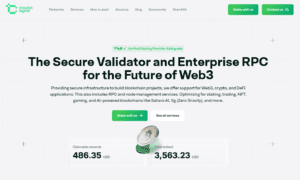Are you tired of the never-ending struggle to efficiently manage your company’s data? Say goodbye to costly hardware and time-consuming maintenance, and say hello to the game-changing solution taking the business world by storm – Desktop as a Service (DaaS). In this blog post, we dive into how DaaS is revolutionizing data management for businesses of all sizes. From increased flexibility and security to seamless collaboration and unmatched scalability, get ready to discover why DaaS is becoming a must-have tool for companies looking to stay ahead in the digital age. Don’t miss out on this innovative trend that is reshaping data management as we know it.
Introduction to Data as a Service (DaaS)
Data as a service (DaaS) is a cloud computing model that provides access to data stored in the cloud. DaaS enables businesses to store and manage data in the cloud without having to invest in on-premises hardware or software.
DaaS is flexible and scalable, making it an attractive option for businesses of all sizes. With DaaS, businesses only pay for the storage and compute resources they use, making it a cost-effective solution for managing data.
DaaS also offers many benefits over traditional on-premises data management solutions. For example, DaaS is easier to implement and manage, is more reliable and secure, and offers better performance and scalability.
If your business is looking for a flexible, scalable, and cost-effective solution for managing data, DaaS may be the right option for you.
What Are the Benefits of Data as a Service?
Data as a Service (DaaS) is a cloud-based solution that helps businesses manage their data more effectively. DaaS provides a central repository for all your data, making it easier to access and share with employees, customers, and partners. It also makes it easier to control who can see and make changes to your data.
With DaaS, you can:
-Better understand your customers by analyzing customer behavior data
-Get real-time insights into your business with up-to-date data
-Make better decisions with data-driven insights
-Decrease IT costs by using cloud services instead of on-premises hardware and software
DaaS is a flexible solution that can be customized to meet the specific needs of your business. Contact us to learn more about how DaaS can help you manage your data more effectively.
How DaaS is Revolutionizing Businesses?
In the past, businesses have had to manage their data using on-premises solutions. These solutions are often complex and expensive, and can be difficult to scale. Additionally, they require businesses to have IT staff on hand to manage the infrastructure.
DaaS (Data as a Service) is a cloud-based solution that allows businesses to outsource their data management to a third-party provider. This means that businesses can benefit from economies of scale, and don’t need to invest in their own infrastructure or staff.
DaaS is becoming increasingly popular as businesses look for ways to reduce costs and increase efficiency. In fact, the global DaaS market is expected to grow from $4.3 billion in 2019 to $18.5 billion by 2024, at a CAGR of 35.2% during the forecast period (2019–2024).
So what’s driving this growth? Here are three key factors:
1. The rise of big data: Businesses are generating ever-increasing amounts of data, and they need a way to store it all safely and securely. DaaS provides an ideal solution, as it offers unlimited storage capacity and the ability to scale up as needed.
2. The need for better data security: With the increased focus on data privacy and security, businesses are looking for ways to better protect their customer data. DaaS offers robust security features, such as encryption and access control, which can help to protect critical data.
3. Greater flexibility: DaaS offers businesses the ability to rapidly scale up or down as necessary to meet changing demands. This kind of agility is proving invaluable in the age of digital transformation.
Ultimately, DaaS provides a powerful and efficient way for businesses to manage their data. As it continues to grow in popularity, it looks set to revolutionize the way businesses manage and utilize their data for years to come.
Challenges of Using DaaS?
Data as a Service (DaaS) is a relatively new concept that is revolutionizing the way businesses manage data. However, there are still some challenges associated with using DaaS.
First, DaaS can be more expensive than traditional data management solutions. This is because DaaS providers typically charge based on the amount of data stored and processed. For businesses with a lot of data, this can be a significant expense.
Second, there can be security risks associated with using DaaS. This is because businesses are essentially outsourcing their data management to a third-party provider. There is always the potential for this provider to mishandle or misuse data.
Third, DaaS can be complex to set up and manage. This is because it often requires integrating with other software applications and systems. For businesses that are not technically savvy, this can be a challenge.
DaaS providers can sometimes be unreliable. This is because they are typically small companies that may not have the same resources and infrastructure as larger companies. As such, they may not be able to provide the same level of service and support.
What Security Measures Must Organizations Take When Implementing DaaS?
Data as a Service (DaaS) is a relatively new concept in the world of data management, and as such, there are still many organizations that are unsure of what security measures they need to take when implementing DaaS. In this article, we’ll outline some of the most important security considerations for organizations to keep in mind when making the switch to DaaS.
One of the most important things to consider when it comes to DaaS security is who will have access to your data. Make sure that you have a clear and concise plan for who needs access to which data sets, and that you restrict access accordingly. Additionally, be sure to encrypt all sensitive data before it is sent to the cloud, as this will help protect it from being intercepted or accessed by unauthorized individuals.
Another key consideration is how you will manage and monitor user activity within your DaaS environment. Be sure to put adequate controls in place so that you can track who is accessing what data, and when. This information can be invaluable in the event of a security breach, as it can help you quickly identify which users may have been impacted and take appropriate steps to mitigate any damage.
Don’t forget about traditional physical security measures when implementing DaaS. Even though your data is stored in the cloud, it’s still important to ensure that only authorized individuals have access to your servers and networking equipment. By taking these simple steps, you can help ensure that your organization stays secure.
How Can Businesses Benefit From using DaaS?
Data-as-a-Service, or DaaS, is a cloud-based model for data management that is rapidly gaining popularity among businesses of all sizes. DaaS provides a number of benefits for businesses, including the ability to scale storage and processing power on demand, pay only for what you use, and access your data from anywhere.
DaaS can help businesses save time and money by simplifying the process of managing data. With DaaS, businesses no longer need to invest in costly hardware and software to store and process their data. Instead, they can access these services on a pay-as-you-go basis from a DaaS provider. This makes it easy for businesses to scale their data storage and processing needs up or down as their business grows or changes.
DaaS can also help businesses improve their flexibility and agility. By storing data in the cloud, businesses can access it from anywhere with an internet connection. This gives them the ability to quickly respond to changes in the market or customer demands. Additionally, DaaS providers often offer tools that make it easy to integrate data from different sources into a single platform. This can help businesses gain insights more quickly and make better decisions about how to grow their business.
Conclusion
Data as a Service (DaaS) has exponentially changed the way businesses manage data, allowing for an easier and more secure way to access information. Whether you are seeking to improve your customer service by consolidating data, or just looking for a simpler solution to store and protect sensitive data, DaaS can provide solutions that were previously unattainable. By managing all of your business’s information in one place, you can rest assured knowing that it is safe and manageable from anywhere at any time.



































